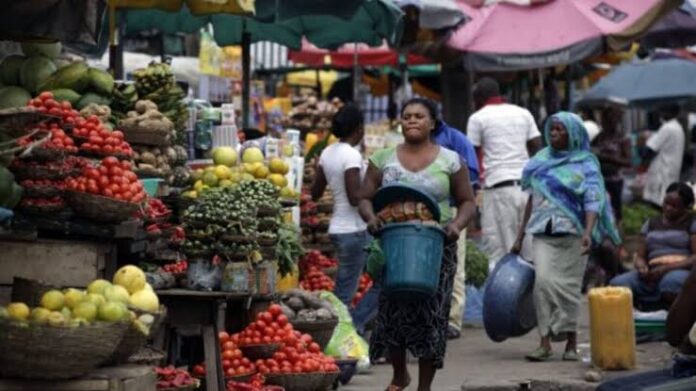By Our correspondent with agency report
Amidst high price of food and other consumables, the consumer price index, which measures the rate of increase in the price of goods and services in Nigeria, climbed to 16.82 per cent in April 2022.
The rate is however1.3 percent points lower compared to the rate recorded in April 2021 (18.12) per cent but the highest since September 2021 (16.63 per cent).
With the development, it means that the headline inflation rate slowed down in April 2022 compared to the same month in the previous year.
The National Bureau of Statistics, NBS said this in its Consumer Price Index (CPI) report for April 2022, released yesterday.
According to the report, increases were recorded in all classifications of individual consumption according to purpose (COICOP) divisions that yielded the headline index.
“On a month-on-month basis, the headline index increased to 1.76 per cent in April 2022, this is a 0.02 per cent rate higher than the rate recorded in March 2022 (1.74) per cent.
“The percentage change in the average composite CPI for the twelve months period ending April 2022 over the average of the CPI for the previous twelve months period is 16.45 per cent, showing a 0.1 per cent decrease compared to the 16.54 per cent recorded in March 2022.
“The urban inflation rate increased to 17.35 per cent (year-on-year) in April 2022 from 18.68 per cent recorded in April 2021, while the rural inflation rate increased to 16.32 per cent in April 2022 from 17.57 per cent in April 2021”, the report reads.
It will be recalled that since February, the Russia-Ukraine war has caused a hike in global oil and food prices.
Meanwhile, bread prices in Nigeria are expected to rise over the coming weeks due to global wheat value chain disruptions caused by the Russia-Ukraine war.
This was disclosed by Wale Okunrinboye, Economic and Financial analysts, on the Nairametrics ‘On the Money’ series on Clubhouse who stated that the impact of the dislocations is expected to hit flour intensive consumers in Africa even more including East Africa and North Africa.
Okunrinboye stated that the Russian-Ukraine region accounts for a large amount of wheat production, and that wheat is a key input in food value chains which Africans rely on for bread, spaghetti, noodles, biscuits and flour-based products.
“The key raw material is wheat, the Ukraine war has knocked out a significant amount of production. What that means is that a large supply is dislocated in countries that are very intensive with wheat, from East Africa to North Africa.
“There are heavy wheat consumers, as East Africa is very high in flour per capita consumption, including Southern Africa and francophone Africa. There are very limited substitutes to switching away”, he said.
He however stated that one thing that offers respite is that the crisis is not affecting rice; otherwise, Nigeria would have had trouble, since it’s a major staple.
“In Nigeria, bread prices will have to go up. That’s because, since the start of the covid pandemic, flour prices have surged already. Last year, prices were up 40%, this year; expect to see higher prices too.
“It’s just going to drive higher food prices, and people will have to switch away or reduce consumption of flour products. We are not seeing rice prices rise and if that was the case, it would have been a worse situation.
“I expect bread prices to move up, just because of the dislocation from Russia,” he added.







